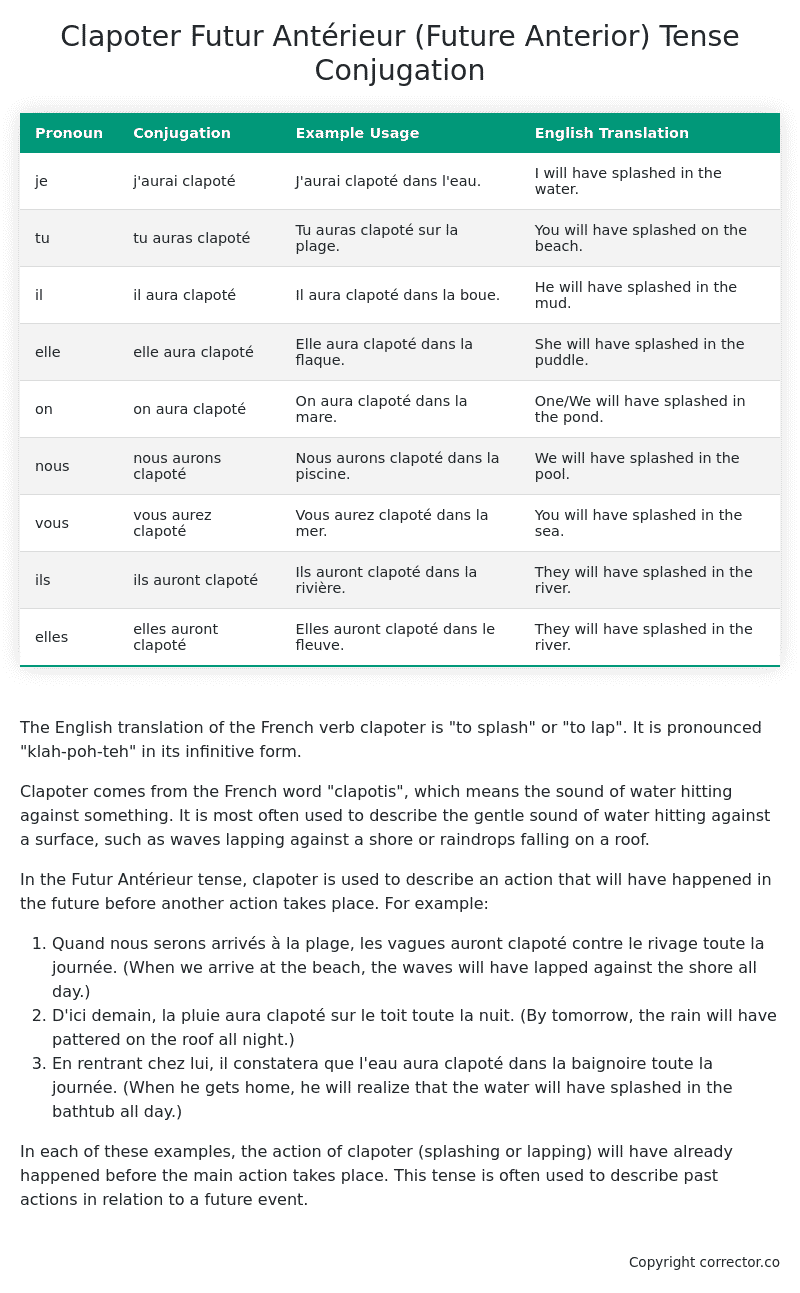Futur Antérieur (Future Anterior) Tense Conjugation of the French Verb clapoter
Introduction to the verb clapoter
The English translation of the French verb clapoter is “to splash” or “to lap”. It is pronounced “klah-poh-teh” in its infinitive form.
Clapoter comes from the French word “clapotis”, which means the sound of water hitting against something. It is most often used to describe the gentle sound of water hitting against a surface, such as waves lapping against a shore or raindrops falling on a roof.
In the Futur Antérieur tense, clapoter is used to describe an action that will have happened in the future before another action takes place. For example:
- Quand nous serons arrivés à la plage, les vagues auront clapoté contre le rivage toute la journée. (When we arrive at the beach, the waves will have lapped against the shore all day.)
- D’ici demain, la pluie aura clapoté sur le toit toute la nuit. (By tomorrow, the rain will have pattered on the roof all night.)
- En rentrant chez lui, il constatera que l’eau aura clapoté dans la baignoire toute la journée. (When he gets home, he will realize that the water will have splashed in the bathtub all day.)
In each of these examples, the action of clapoter (splashing or lapping) will have already happened before the main action takes place. This tense is often used to describe past actions in relation to a future event.
Table of the Futur Antérieur (Future Anterior) Tense Conjugation of clapoter
| Pronoun | Conjugation | Example Usage | English Translation |
|---|---|---|---|
| je | j’aurai clapoté | J’aurai clapoté dans l’eau. | I will have splashed in the water. |
| tu | tu auras clapoté | Tu auras clapoté sur la plage. | You will have splashed on the beach. |
| il | il aura clapoté | Il aura clapoté dans la boue. | He will have splashed in the mud. |
| elle | elle aura clapoté | Elle aura clapoté dans la flaque. | She will have splashed in the puddle. |
| on | on aura clapoté | On aura clapoté dans la mare. | One/We will have splashed in the pond. |
| nous | nous aurons clapoté | Nous aurons clapoté dans la piscine. | We will have splashed in the pool. |
| vous | vous aurez clapoté | Vous aurez clapoté dans la mer. | You will have splashed in the sea. |
| ils | ils auront clapoté | Ils auront clapoté dans la rivière. | They will have splashed in the river. |
| elles | elles auront clapoté | Elles auront clapoté dans le fleuve. | They will have splashed in the river. |
Other Conjugations for Clapoter.
Le Present (Present Tense) Conjugation of the French Verb clapoter
Imparfait (Imperfect) Tense Conjugation of the French Verb clapoter
Passé Simple (Simple Past) Tense Conjugation of the French Verb clapoter
Passé Composé (Present Perfect) Tense Conjugation of the French Verb clapoter
Futur Simple (Simple Future) Tense Conjugation of the French Verb clapoter
Futur Proche (Near Future) Tense Conjugation of the French Verb clapoter
Plus-que-parfait (Pluperfect) Tense Conjugation of the French Verb clapoter
Passé Antérieur (Past Anterior) Tense Conjugation of the French Verb clapoter
Futur Antérieur (Future Anterior) Tense Conjugation of the French Verb clapoter (this article)
Subjonctif Présent (Subjunctive Present) Tense Conjugation of the French Verb clapoter
Subjonctif Passé (Subjunctive Past) Tense Conjugation of the French Verb clapoter
Subjonctif Imparfait (Subjunctive Imperfect) Tense Conjugation of the French Verb clapoter
Subjonctif Plus-que-parfait (Subjunctive Pluperfect) Tense Conjugation of the French Verb clapoter
Conditionnel Présent (Conditional Present) Tense Conjugation of the French Verb clapoter
Conditionnel Passé (Conditional Past) Tense Conjugation of the French Verb clapoter
L’impératif Présent (Imperative Present) Tense Conjugation of the French Verb clapoter
L’infinitif Présent (Infinitive Present) Tense Conjugation of the French Verb clapoter
Struggling with French verbs or the language in general? Why not use our free French Grammar Checker – no registration required!
Get a FREE Download Study Sheet of this Conjugation 🔥
Simply right click the image below, click “save image” and get your free reference for the clapoter Futur Antérieur tense conjugation!

Clapoter – About the French Futur Antérieur (Future Anterior) Tense
Construction
Common Everyday Usage Patterns
Interactions with Other Tenses
For example
Summary
I hope you enjoyed this article on the verb clapoter. Still in a learning mood? Check out another TOTALLY random French verb conjugation!


